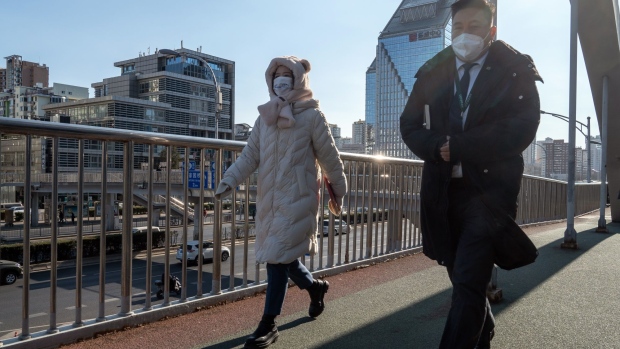Dec 26, 2022
China Banks Rush Traders Back to Office Amid Covid Disruptions
, Bloomberg News

(Bloomberg) -- Some Chinese financial institutions are rushing employees back to office as surging absences of traders and other key personnel due to the nation’s massive Covid-19 outbreak start to disrupt operations.
Sinolink Securities Co. is asking staff who were off sick or home quarantined for seven days to return to work if they no longer show Covid symptoms, while those who have family members infected but have not tested positive themselves should also work from the office, according to a memo seen by Bloomberg. An unusually low attendance rate has brought significant challenges to its operation, the broker added.
Sinolink’s Shanghai-based media representative said the company continues to focus on areas including employee well-being, workplace safety and business continuity in a written reply.
One fund-management firm over the weekend dropped an earlier requirement that staff can only return to the office with a negative Covid test result within 72 hours, a person with knowledge of the matter said, asking not to be identified while discussing private information. Department heads were told to keep as many people in office as needed to ensure business continuity, the person said.
At least two asset managers are making rare compromises by allowing Covid-infected traders to work remotely for the first time, people familiar with the matter said. The firms require employees who were off sick to have surveillance cameras installed at home so that all their transactions can be monitored when they’re well enough to work, people familiar with the matter said.
The efforts come at a time when Covid infections, estimated near 37 million on a single day last week by the nation’s top health authority, are pushing economic activity off a cliff. Beijing’s swift dismantling of Covid Zero restrictions has led to the unfettered spread of the highly contagious omicron variant in a population with low levels of natural immunity.
The government hasn’t offered a lot of specific guidance for how to contend with the latest surge of infections but has urged citizens to take responsibility for their health and emphasized personal hygiene measures. China also scrapped quarantine requirements for travelers arriving from abroad and has downgraded the management of Covid from the highest level to the second highest, effectively removing the legal justification for aggressive Covid Zero restrictions.
The virus’ spread as the containment policy is rolled back has caused widespread disruptions to businesses, prompting cities including the western metropolis of Chongqing and those in the eastern manufacturing hub of Zhejiang province to push for workers with mild symptoms to go back to work.
Some Chinese banks activated backup plans two weeks ago to cope with a sudden uptick in the number of sick employees, which had in some cases led to the drop in onshore yuan-dollar spot volumes.
Still, even for those in Shanghai who have been well trained in dealing with Covid during a grueling two-month lockdown earlier this year, the latest outbreak is more disruptive than expected. At one bank’s trading department, nearly 80% of the traders were either off sick or working from home, making the previous arrangements such as split teams or routing trades through those at the office nearly impossible, one of the people said.
(Updates to add end of quarantine requirements in seventh paragraph.)
©2022 Bloomberg L.P.






